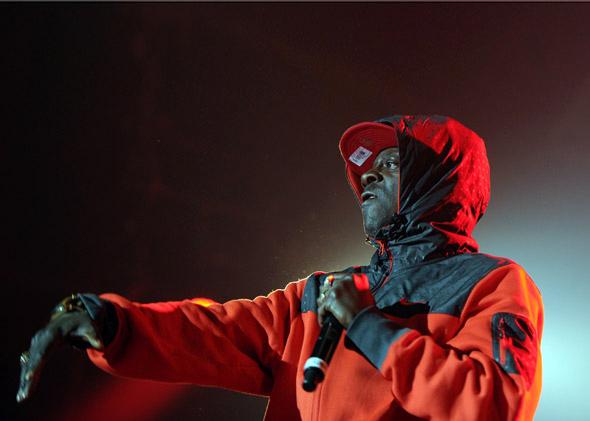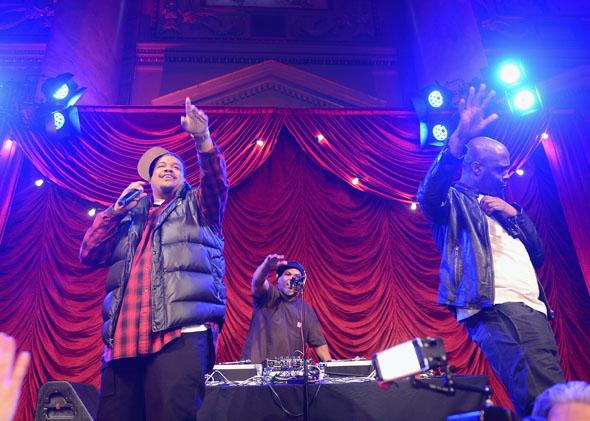On Valentine’s Day, De La Soul released most of their back catalog for free. Fans rejoiced at the unexpected gift, which included the albums 3 Feet High and Rising (1989), De La Soul Is Dead (1991), Buhloone Mind State (1993), and Stakes Is High (1996) and dozens of rare remixes, B-sides, and instrumentals. The move generated huge amounts of buzz and goodwill, judging by the outpouring of affection on Facebook, Twitter, and around the Web. It will help, no doubt, with the tour they just announced, on the eve of their 25th anniversary as a group.
“I think it’s probably one of the ballsiest moves that has ever been made in the history of the hip-hop business,” says hip-hop historian Jeff Chang, author of the book Can’t Stop Won’t Stop.
Fans were particularly hungry for this music. For many years, De La Soul has been sidelined by their inability to make their work available for sale digitally. With the exception of The Grind Date, released in 2004, and a few scattered newer releases, most of the group’s back catalog wasn’t readily available. You can find their albums on vinyl and CD, but you can’t buy the MP3s.
Why couldn’t De La Soul reissue their albums in MP3 format and make them available for a fair price on iTunes? As many of its fans know, the group has a tangled history with sampling and copyright law; a post last week by the advocacy group the Future of Music Coalition offered a useful primer on the situation. De La Soul’s first three albums were classics of hip-hop’s sampladelic golden age—a time when artists sampled liberally and were more cavalier about securing (or not securing) permission to use those samples.
An interesting, if confusing, twist in De La Soul’s story is that their label at the time, Tommy Boy, did clear the samples (or at least the ones they knew about) when the albums were originally released. That’s according to Tommy Boy label boss Tom Silverman, in the documentary Copyright Criminals and the book Creative License, by University of Iowa communications professor Kembrew McLeod and Northwestern law professor Peter DiCola. “It’s a lot of accounting work,” Silverman told McLeod and DiCola, discussing the early De La Soul albums. “You have to pay out on 60 different people on one album. It’s quite a nightmare actually.” There was, however, an infamous sample the label did not clear, from a band called the Turtles, who were sampled on 3 Feet High and Rising. De La Soul and their producer, Prince Paul, used a sample from the Turtles song “You Showed Me” in the skit “Transmitting Live from Mars,” layering the dulcet psychedelic tones under an instructional French-language record. In 1991, the Turtles sued the group for copyright infringement. According to McLeod and DiCola’s book, the case was settled out of court for an amount said to be $1.7 million, though the members of De La Soul have said the amount actually paid out was less than that.
The main problem now isn’t the Turtles, though the costly lawsuit did cast a pall over De La Soul’s legacy and struck fear into the hearts of sampling mavens and record labels everywhere. The problem seems to be that Warner Music Group—which now owns De La Soul’s Tommy Boy back catalog, though it no longer owns Tommy Boy—hasn’t yet done the legwork for the albums to be released digitally. “Warner has not done the sample clearance work necessary to release them,” Silverman told the journalists Peter Kafka and Rob Levine recently in a tweet. (I reached out to Silverman for comment but did not hear back; a representative from Warner Music Group declined to comment.)
As badly as the group, and its fans, would like to see the music available, it would take effort for Warner to make it possible. Releasing De La Soul’s music digitally would require spending the time and money to make sure there aren’t other samples that weren’t cleared initially, like the Turtles song, and whether there are agreements that would need to be renegotiated. A single De La Soul album could have a few hundred samples, all of which needed to be licensed and would need to be scrutinized.
If Tommy Boy cleared the samples originally, what’s the holdup now? A lot has changed since 3 Feet High and Rising came out 25 years ago. “First off, the phrase ‘clearing samples’ is in and of itself ambiguous,” says Howard King, an entertainment lawyer in Los Angeles who represents Metallica, RZA, Dr. Dre, Robin Thicke, and many other major artists. “Because it really depends on for what uses they cleared them. Clearing samples 25 years ago—nobody really thought about digital.” Contracts written in 1989 to “clear” samples for recordings on vinyl, cassettes, and CDs may not cover digital use—the MP3 didn’t exist back then.
“It would depend on the original scope of the license that was granted,” says Lisa Borodkin, an entertainment lawyer in Los Angeles who has worked on clearing samples for Eminem and Dr. Dre. “When people clear samples in the industry—I did this for years in a music law firm—you definitely usually show the artist how the music is going to be used.” David Jude Jolicoeur, better known as Dave, one of the group’s three members, suggested in an interview with Revolt TV last week that the old contracts do indeed lack digital clearances. “It’s just the language that are in contracts that are so old and from so long ago,” he said. “The language in these contracts don’t include digital sales. So we’re working on that now, actually.”
King adds that current technology also makes it easier to spot samples that may have been missed before. This includes software like Pro Tools, which makes it possible to closely examine a song, and websites like whosampled.com that have compiled meticulous lists of samples. “These websites have created a whole new spate of litigation for samples you can’t hear,” King says. “The technology is such that you can find them.”
Online stores like iTunes tend to be circumspect about carrying music that might have copyright issues. Sample-heavy albums can be ticking time bombs, says McLeod. “As long as you keep selling them or [are] keeping them available, you are the potential target of a copyright infringement lawsuit,” McLeod says. “Someone can always pop out of the woodwork and sue today. That’s one reason why De La Soul’s albums, and also Public Enemy and other classic golden-age groups, have had a lot of difficulty being made available on legit online stores.” The Knack, for instance, emerged 20 years later, in 2006, to sue Run-DMC for sampling “My Sharona” in their 1986 tune “It’s Tricky.” They also named Amazon, iTunes, Yahoo, and Napster in the lawsuit.

Photo by Alain Jocard/AFP/Getty Images
Public Enemy, whose great early albums were released on Def Jam, which is now owned by Universal, seems to have resolved its copyright issues for now; you can currently buy the group’s classic albums on iTunes and other sites. It was a long, hard road to get there; Public Enemy faced a similarly tricky situation with sampling. “ ‘Fight the Power’ has, like, 17 samples in the first 10 seconds,” Public Enemy’s Chuck D told journalist Mark Dery in 1990, estimating that there were “about 150, maybe 200” samples on Fear of a Black Planet alone. Chuck D has long been a savvy proponent of digital distribution, starting his own company, SpitDigital, to help groups get onto online stores. But in general, McLeod says, it’s easier for iTunes and other online stores to sell classic rock than it is to deal with the legal hassles of selling classic hip-hop albums.
In an interesting wrinkle to the story of De La Soul’s Valentine’s Day present to its fans, several tech news sites such as Recode and The Verge reported that the albums in De La Soul’s free giveaway may have been downloaded illegally: Metadata on some of the albums revealed the URL of the Russian pirate site Rappalata. If the albums were indeed pirated, it might read as a political statement, driving home the fact that the band doesn’t own their master tapes. It may also be an acerbic joke from a group that specialized in them. “Given De La Soul’s sense of humor, I think it would be entirely possible that it’s an inside joke, a meta-commentary on the craziness that is today’s music industry, when they can’t even make their own music available through legitimate channels,” says McLeod.
It’s understandable why the group might feel frustrated by the situation. It doesn’t just affect their ability to sell their music—it may have also affected their legacy as musicians. Chang says that De La Soul’s contemporaries—groups like A Tribe Called Quest—vastly exceed De La Soul in their currency with a younger crowd, in part because their music is much more readily available. “I teach a hip-hop class at Stanford,” Chang says. “The kids walk in, and they know about A Tribe Called Quest. Say you bump into a VH1 thing, and they have the best rap songs of the ’90s or whatever, and Tribe comes on; you immediately go to iTunes and buy it. But you don’t understand they all came from De La Soul and Jungle Brothers, and De La in so many ways cleared the path for all these groups to blow up.”
Another way to reach a new generation of listeners is through a lavish anniversary rerelease of an iconic album. Rhino Records, under the Warner umbrella, did a nice vinyl reissue of 3 Feet High and Rising last year. Universal is currently in the process of reissuing several hip-hop albums in its “Respect the Classics” series, including Public Enemy’s It Takes a Nation of Millions to Hold Us Back. Some will be expanded reissues, but many of the releases are faithful replicas of the original material. McLeod points to the Beastie Boys’ Paul’s Boutique 20th anniversary edition, released by Capitol in 2009, which didn’t have any bonus tracks. “The reason why Public Enemy, the Beastie Boys, and De La Soul haven’t been able to release reissues of expanded albums is because once they re-release an altered version of the actual album they have to relicense from all the sample holders, which is totally crazy,” McLeod says.
On Valentine’s Day, De La Soul’s members took matters into their own hands and essentially reissued their own work digitally for a short 25-hour window. “Now we have to wait until we actually deal with the legalities and actually get it out there as best we can,” Jolicoeur said on Revolt TV. Several of the experts I spoke with noted that even a free digital release could result in copyright headaches for a group. But Chang forecasts that De La Soul’s high-profile music giveaway will pay off; it boosts the band’s brand, which will help it with touring, and, more generally, with solidifying its legacy. “Now they can make the record, go back to the booking agent, get the advances that they really deserve,” Chang says. “Their name is on everybody’s lips.”
The stunt might also send a message to Warner that there’s an eager market for a digital release. Albums like the platinum-selling 3 Feet High and Rising “weren’t some rare 100-edition private-press psychedelic record from the 1960s,” says Chris Weingarten, author of a book on Public Enemy’s It Takes a Nation of Millions to Hold Us Back. “They were a phenomenon.”
“Their music is out there,” Weingarten added. “It’s not going anywhere, whether or not you can listen to it on the trendy streaming device of today.”
